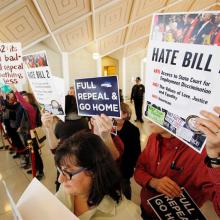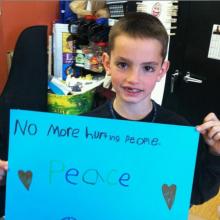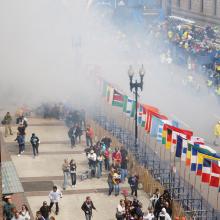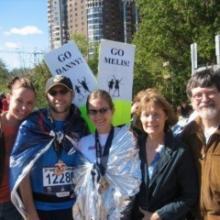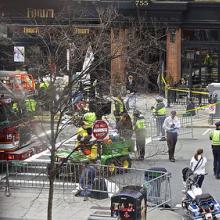boston
When about 50 people found themselves stranded last week on Martha’s Vineyard, the island’s nonprofit social services agency called on local churches to help. “We rallied and did what any decent human being would do if strangers showed up,” local pastor Rev. Charlotte Wright told Sojourners this week.
Tania Fernandes Anderson, Boston’s newly elected councilor, embraces struggle.
In November, she made history as Boston’s first Muslim, first African immigrant, and first formerly undocumented person to be elected to the city council. Now, with an ambitious slate of policy goals, she hopes to transform the city she calls home. While politics brings a new set of challenges for Anderson, her struggle doesn’t take place at city hall. Rather, her struggle is spiritual.
The Supreme Court’s new nine-month term, which begins on Monday, promises to be among the most momentous in generations. The justices are poised to decide major cases that could roll back abortion rights and broaden gun and religious rights.
Here is a look at some of cases the court will decide during the term, which runs through the end of next June.
Collins, who was sexually abused by a priest at age 13, resigned on March 1, citing what she called “shameful” resistance to commission proposals from the Vatican’s powerful doctrinal office, which is responsible for pursuing cases against abusive priests and bishops.
Saunders stepped aside after publicly calling for Australian Cardinal George Pell to be dismissed, after news reports surfaced that he had protected pedophile priests in Australia. Pell serves as the Vatican’s finance chief.
In a major setback for the pope, Collins on Mar. 1 announced that she had resigned from the Pontifical Commission for the Protection of Minors, established by the pontiff in 2013 to counter abuse in the church.
She said the pope’s decision to create the commission was a “sincere move,” but there had been “constant setbacks” from officials within the Vatican.
“There are people in the Vatican who do not want to change, or understand the need to change,” Collins said in a telephone interview from Dublin.
After sessions on gravitational waves, nuclear forensics, and artificial intelligence, one of the world’s largest general science conferences invited attendees to hear from an Episcopal priest.
The Rev. Fletcher Harper preached on climate change, and how to get a vast segment of the world’s population to pay better attention to what scientists know but many others doubt: that the problem is worsening and portends disaster.
“My entreaty for scientists is to be able to speak publicly about why you care,” said Harper, executive director of GreenFaith, an interfaith nonprofit that aims to galvanize religious people to safeguard the environment.
For much of its long history in the U.S., the Catholic Church was known as the champion of the working class, a community of immigrants whose leaders were steadfast in support of organized labor and economic justice – a faith-based agenda that helped provide a path to success for its largely working-class flock.
In recent decades, as those ethnic European Catholics assimilated and grew wealthier, and as the concerns of the American hierarchy shifted to battles over moral issues, such as abortion and gay marriage, traditional pocketbook issues took a back seat.
A deal has fallen apart to undo the North Carolina law known as the “bathroom bill,” in a sign of the state’s bitter political divide.
The state’s legislature was called into a special session on Dec. 21, to consider repealing the law known as HB2 after months of pressure, including lost jobs and canceled sporting events and concerts.
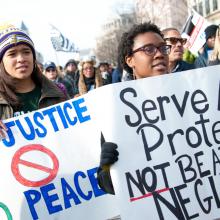
Image via Rena Schild/Shutterstock.com
There is change for racial justice and equity in the air in Boston, to an extent that I previously only hoped for but could not heretofore have envisioned. And as I look ahead to attending Sojourners’ upcoming leadership Summit, which focuses on the intersections and implications of race across numerous justice issues, I expect and pray for change to be in the air in D.C., and that the same winds may fill our sails in June.

Image via REUTERS / Brian Snyder / File photo / RNS
After 11 years of defiantly occupying a parish building that the Archdiocese of Boston ordered closed in 2004, the people of St. Frances X. Cabrini Church in Scituate, Mass., are finally handing over the keys. The tenacious protesters, angry their parish would be closed in the wake of the clergy sexual abuse crisis, lost their final Hail Mary bid to reopen the church May 16 when the U.S. Supreme Court declined to hear their case.

Cardinal Sean O'Malley. Image via George Martell/Pilot New Media/Roman Catholic Archdiocese of Boston/flickr.com
Cardinal Sean O’Malley, head of the Archdiocese of Boston, whose record on clergy sex abuse was uncovered by The Boston Globe and portrayed in this year’s Oscar-winning film Spotlight, has praised the movie for forcing the Catholic Church to acknowledge its “crimes and sins.”
“Spotlight is an important film for all impacted by the tragedy of clergy sexual abuse,” said O’Malley, who was named to the archdiocese after Cardinal Bernard Law was forced from office in 2002 following revelations that church officials protected abusive priests.
What does the ancient arrangement of tents in an ancient Israelite encampment have to do with the ultramodern question of whether the U.S. government should be peering into the ultramodern phone and Internet records of hundreds of millions of Americans?
Or to put it another way, are there any spiritual and religious roots to the notion of personal and household privacy?
To start from the Bible: Many Jewish prayer services begin with a quotation from a non-Jewish shaman, himself quoted in the Torah (Num 24:5 — this passage of Torah will be read two weeks from now, on June 22.) There was a king, Balak by name, who hired an expert shamanic curse-hurler, Balaam, to curse the People of Israel who were swarming across the wilderness after their liberation from slavery under Pharaoh.
I wonder if social isolation — not extremist religion or Chechen roots — explains the two brothers who set off bombs during the Boston Marathon, killing three and wounding more than 170.
The older brother, Tamerlan Tsarnaev, was quoted as saying “I don’t have a single American friend, I don’t understand them.” One emerging theory is that, he dealt with isolation in America by seeking his heritage in Chechnya and there, some think, found purpose in violence against his unwelcoming home.
In feeling isolated, the alleged bomber isn’t alone. Isolation is the new normal in America.
I woke up this morning, like everyone else, to the news of a shootout with one suspect in the Boston Marathon bombing and the ongoing manhunt for a second brother. Like many others, I’ve heard lots of misinformation over the past few days about whether officials did or didn’t have a suspect, whether they did or didn’t have them in custody, and so on.
“I heard someone dropped a bomb on Boston,” said Mattias, my 9-year-old son, over breakfast while I scrolled through the breaking news reports.
“Not exactly,” I said. “It was two guys. Two brothers who came from [another country] to go to college at MIT.” They put homemade bombs in and around trashcans by the finish line of the marathon.”
“Why?” he asked.
“I really don’t know.”
“Maybe they were angry about something, and they didn’t know how to talk about their feelings.”
“Maybe so,” I nodded.
“Did they hurt people?”
President Barack Obama praised Bostonians for their actions “in the face of evil” during an interfaith memorial service on Thursday for victims of the Boston Marathon bombing.
“You’ve shown us, Boston, that in the face of evil, Americans will lift up what’s good. In the face of cruelty, we will choose compassion,” Obama said.
The 90-minute service at the Cathedral of the Holy Cross featured local political figures and religious leaders from Christian, Jewish and Islamic traditions. Boston Cardinal Sean O’Malley shared a greeting with the congregants from Pope Francis.
“The Holy Father invokes God’s peace upon our dead, consolation upon the suffering and God’s strength upon all those engaged in the continuing work of relief and response,” O’Malley said.
Obama opened his remarks with Scripture, and quoted it throughout his speech.
What do you say in the face of evil?
The stories from Monday’s attacks at the Boston Marathon are heartbreaking, gut-wrenching. One in particular stands out to me. A woman was waiting for her husband to cross the finish line when the bombs exploded. For three hours she searched frantically for him, not knowing if he was alive or dead, not knowing if he was frantic and looking for her. Her voice cracked and tears flowed with the raw memory as she told of the moment when she and her husband embraced.
Moments like this, even when they end happily, remind us of our vulnerability. As hard as we try to protect ourselves with heightened security measures, we know that complete invulnerability is impossible. I am vulnerable. My wife is vulnerable. My children are vulnerable. We cannot escape it.
In the face of gun violence and bombings, gender violence and rape, we would be irresponsible not to ask big questions about evil and human vulnerability.
A few hours after the bombing, President Barack Obama addressed our natural desire to carry out justice after these events.
[M]ake no mistake; we will get to the bottom of this. We will find out who did this, we will find out why they did this. Any responsible individuals, any responsible groups, will feel the full weight of justice.
Like the president, I want to take action against evil and I want to know I am secure. I hate admitting that I’m vulnerable. But the president’s words didn’t reassure me. They made me feel more vulnerable because the phrase “full weight of justice” is always a veiled call to violence.
When it comes to running, America often looks like a country divided between apostles and apostates.
For true believers like Olympian Ryan Hall, marathons assume an almost-biblical importance.
“I have heard stories and had personal experiences in my own running when I felt very strongly that God was involved,” Hall, an evangelical Christian, has said.
Other Americans — athletic atheists, you might call them — roll their eyes and see marathons as a painful waste of a perfectly nice day.
In the Church of Running, I sit somewhere in the back pew.
No sooner had the reality of the Boston Marathon bombing sunk in on Monday afternoon than Muslim activists in the U.S. began sending out a slew of news releases, tweets, and Facebook messages urging prayers and aid for the victims — and condemning whoever was behind the horrific attack.
“American Muslims, like Americans of all backgrounds, condemn in the strongest possible terms today’s cowardly bomb attack on participants and spectators of the Boston Marathon,” Nihad Awad, executive director of the Council on American-Islamic Relations said in a statement on Monday.
It’s a familiar race against time for Muslim groups. Almost as soon as the smoke cleared around Copley Square, they knew from long experience that some would immediately point the finger of blame in their direction.
Many widely believed Muslims were behind the 1995 Oklahoma City bombing, until American militiaman Timothy McVeigh was convicted of the crime.
“We also call for the swift apprehension and punishment of the perpetrators,” Awad added, echoing a statement from the Muslim Public Affairs Council that called on “all of us as Americans to work together to bring those responsible to justice.”
Resurrection is the theme of the 50 days of Eastertide. Yet, for decades, the month of April has been filled with particularly horrific deaths:
- The assassination of Martin Luther King, Jr. (April 4, 1968)
- The murder of 13 persons at the American Civic Association Immigration Center in Binghamton, N.Y. (April 3, 2009)
- The shooting death of 32 students at Virginia Tech. (April 16, 2007)
- The end of the Waco siege and the death of 82 members of the Branch Davidians. (April 19, 1993)
- The bombing of the Alfred P. Murrah Federal Building in Oklahoma City that killed one hundred sixty-eight children and adults. (April 19, 1995)
- The Columbine High School shooting resulting in deaths of 15 persons (April 20, 1999), a shooting that has been echoed in 31 schools since, most recently in Sandy Hook Elementary School of Newtown, Conn.
In 2013, April continues its trend. On Monday, April 15, someone decided to plant bombs along the route of the Boston Marathon. The explosions killed at least three people and wounded more than 100. Among the dead is 8-year-old Martin Richard.
It is in times and tragedies like those that happened in Boston that our call to pray for our enemies is most difficult. May we be faithful to pray for them despite our circumstances.
Lord have mercy, Christ have mercy on me, a sinner. Lord have mercy, Christ have mercy, on all of us, sinners.
Father, we don't know who was behind the tragedies in Boston, but we do know that they were human. And we know we are to pray for our enemies.
In Jesus we see humanities true identity as ones who are to be agents of life, not death. Jesus, as first of New Creation, invites all humanity to reflect and participate in New Creation.







